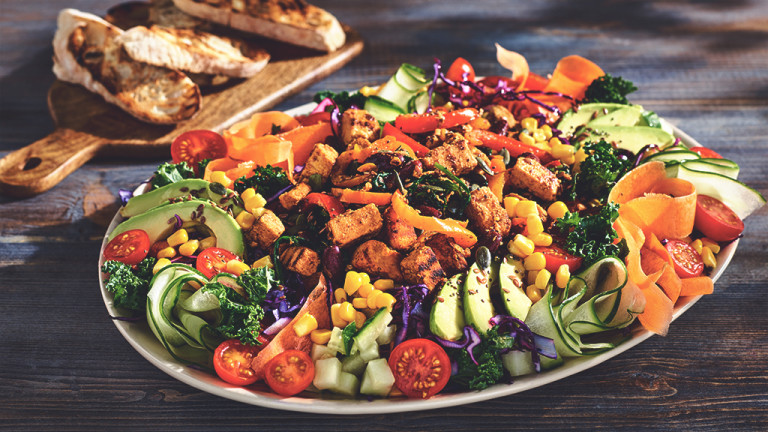Quorn and the British Dietetic Association (BDA) have launched a brand-new educational campaign called Sustainable Eats. The project, which has been launched as part of the BDA’s wider One Blue Dot programme, is aimed at encouraging people to moderate their meat intake, while seeing the nutritional and environmental benefits of doing so.
The Sustainable Eats tool is accessible on the BDA’s website, presenting an interactive experience for users to embark on a culinary journey, taking them from fully meat-based meals to 50:50 to those based exclusively on Quorn.
The tool is primarily targeted at providing Dietitians with a resource to guide conversations with clients who are interested in finding out more about healthy, sustainable eating patterns. It will also include a stand-alone supporting report for Healthcare Professionals, which will explain the rationale behind the project and how to best use the tool effectively. Additionally, anyone can access the site and there are recipe videos for consumers to follow along with at home.
On World Food Day, celebrated today, Quorn and the BDA aim to use the Sustainable Eats project to show people that, by making small switches to their diets, they can have a big impact on their individual carbon footprint and overall health. As well as incorporating Quorn mycoprotein - the unique fungal ingredient in all Quorn products – the recipes provide a whole diet approach to improve the nutritional value of the meals through boosting veg and reducing ingredients which are higher in saturated fats.
Recent research published by the University of Exeter evidences Quorn mycoprotein, as a beneficial ingredient for both muscle maintenance and the reduction of low-density lipoproteins (LDL). Quorn mycoprotein is a complete source of protein – it contains all nine essential amino acids, high in fibre and a source of key micronutrients such as zinc, choline, and B vitamins – riboflavin, B12, folate, phosphorous, manganese.
To encourage people to try cooking with this nutritious protein, Quorn has provided recipes for a series of family favourites that can be made wholly or in part using their products, including:
- Spaghetti Bolognese
- Chilli Con Carne
- Paella
- Fajita Wraps
- Tikka Masala Curry
The tool also includes a fourth stage called ‘The Reinvention Test’ to bring attention to the importance of avoiding food waste, an important factor in a sustainable diet. This will be the call to action for people to get creative with their own dishes made from the leftovers of the above recipes. Quorn will be using the hashtag #ReinventYourPlate to allow users to get involved on social media.
Some of the suggested recipes for ‘The Reinvention Test’ include:
- Loaded Sweet Potatoes
- Korean Sliders
- Paella Arancini
- Rainbow Salad
- Bombay Tikka Pie
Every recipe provided for the Sustainable Eats tool has received a complete nutritional analysis by BDA dietitians as well as being carbon footprinted by Carbon Cloud. Having first announced the decision to include carbon labelling on its product packaging back in January, Quorn is an industry leader for the scheme. The company hopes that, by including data on these recipes, it can raise further awareness about carbon labelling and show consumers how they can use it to make educated food choices that benefit the planet.
Tess Kelly, Sustainable Development Manager at Quorn Foods, said: “We are delighted to partner with the BDA to create the Sustainable Eats toolkit and hope that it will provide dietitians and healthcare professionals with a valuable tool with which to help their clients. On World Food Day, it is important that we recognise the role that our individual food choices make on the world around us. We believe that our unique ingredient, mycoprotein, is a nutritious, sustainable protein that will be an important part of the diet of the future and we hope this resource will show people how easy it is to cook with. The world has reached a pivotal moment in dictating its future and Quorn is committed to helping people make choices that help both our people and planet.”
Jo Lewis, Partnerships Manager at the BDA said: “Our research into healthy, sustainable eating patterns shows that significant shifts in current UK habits will be required to meet essential climate targets. While all stakeholders including the BDA work to influence policies which affect food systems, our it’s also essential to support behaviour change at an individual level so that people try incorporating non-animal sources of protein and more plant foods into meals. These recipes with Quorn show what small changes people can make to familiar recipes to create meals which are nutritious, tasty and make a contribution to managing their climate footprint”.
You can access the Sustainable Eats tool here.
